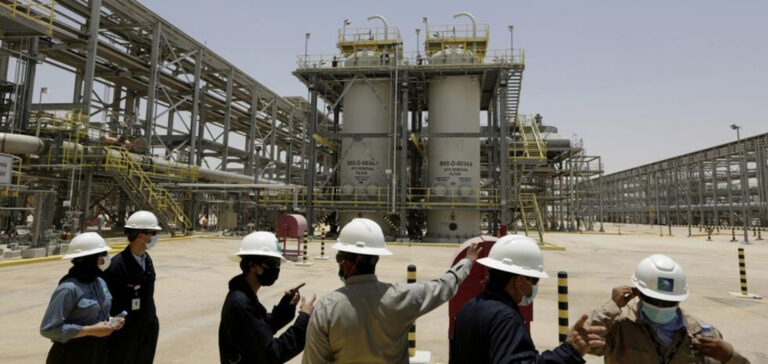Saudi oil giant Aramco has reported a sharp fall in profits for the third quarter of the year. According to the company’s official press release, profits fell to $32.58 billion, down 23% on the $42.43 billion earned in the same period last year.
Factors behind Aramco’s falling profits
This decrease is mainly the result of two major factors: the fall in world oil prices and voluntary production cuts by Aramco. The press release explains that the results reflect the adverse effects of both lower oil prices and lower sales volumes.
Oil price volatility and its impact
To contextualize the situation, it is essential to look back at the dynamics of the oil market in recent times. In 2022, the world witnessed a surge in oil prices, fueled by factors such as the post-pandemic economic recovery and the Russian invasion of Ukraine. These events propelled oil prices to impressive heights, with the price per barrel reaching up to 130 dollars.
Aramco’s production cuts and their effects
During this period, Aramco recorded what was described as a “record” profit of $161.1 billion, enabling the Saudi Kingdom to achieve its first annual budget surplus in almost a decade.
By 2023, however, average oil prices are expected to stabilize at around $85 a barrel, according to Jadwa Investment, a Riyadh-based company specializing in financial analysis. Some analysts believe that keeping Saudi Arabia’s budget in balance would require an oil price of around $80 a barrel. However, this objective could be compromised by the Kingdom’s increased public spending and reduced oil production.
The Israel-Hamas Conflict: Implications for Oil Markets
Aramco, as the world’s largest oil exporter, had announced a production cut of 500,000 barrels a day in April, as part of a coordinated effort with other oil-producing countries to support prices. In June, the Saudi Ministry of Energy announced a further reduction of one million barrels per day, which took effect in July. This reduction is set to continue until December, as confirmed by the Ministry.
Currently, the Kingdom’s production stands at around nine million barrels per day, well below its declared daily capacity of 12 million barrels.
Market Experts’ Outlook
One notable concern that has dominated the markets in recent weeks is the potential impact of the ongoing conflict between Israel and Hamas. The conflict, which began with a violent attack by a Palestinian Islamist group on Israeli soil on October 7, has resulted in heavy casualties on both sides.
In retaliation, Israel, with the aim of “wiping out” Hamas, carried out incessant air strikes in the Gaza Strip. These ongoing bombardments have caused over 10,000 deaths in the Palestinian territory since October 7, according to the Hamas-run Ministry of Health.
Saudi GDP falls in Q3
Market experts expressed fears that the violence could escalate and spread, possibly involving state actors and threatening oil supplies. Jadwa Investment highlighted these concerns in a report published at the end of October, while acknowledging that such worries may be exaggerated.
Herman Wang, Associate Director of Oil Information at S&P Global Commodity Insights, raised questions about the impact of the Israel-Hamas conflict on Saudi production. Prior to the dispute, the Kingdom was expected to remain cautious and disciplined in cutting production to maintain price stability, given the outlook for demand in the first quarter. This approach would continue to restrict Aramco’s production and limit its exports, as shown by the latest GDP data.
Last week, the Saudi Statistics Authority announced a 4.5% year-on-year decline in Saudi Arabia’s third-quarter GDP, largely due to a 17.3% drop in oil-related activity.






















